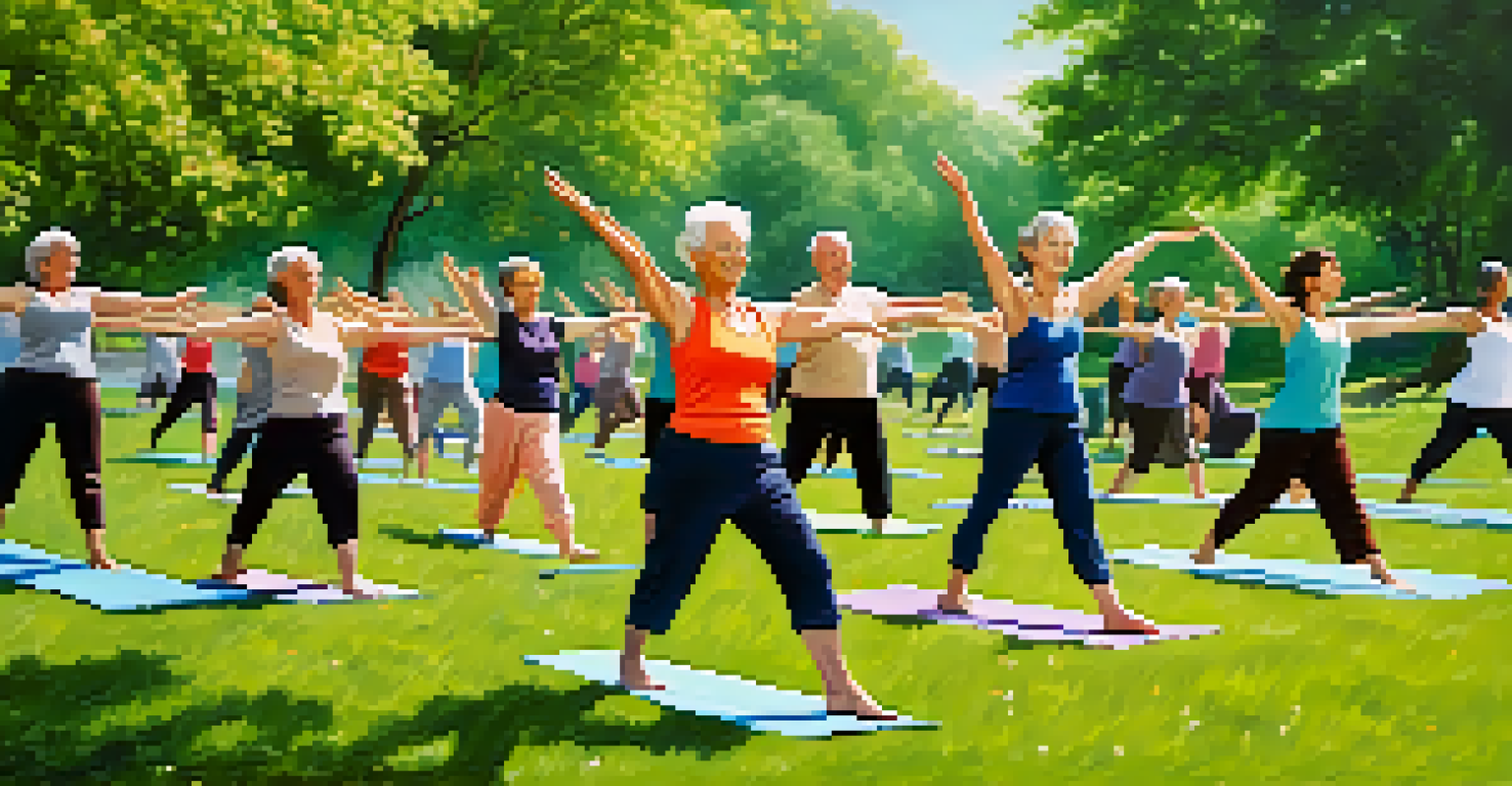Preventative Measures: Avoiding Dangerous Situations for Seniors

Understanding Common Risks Faced by Seniors
Seniors often encounter unique risks that can lead to dangerous situations. These include falls, health emergencies, and even scams targeting their vulnerability. Understanding these risks is the first step towards prevention, allowing for proactive measures to be put in place.
An ounce of prevention is worth a pound of cure.
For instance, falls are a leading cause of injury among older adults, often due to slippery floors or uneven surfaces. By identifying potential hazards at home, seniors can minimize their chances of falling. This awareness not only empowers them but encourages family members to assist in creating a safer environment.
Moreover, health emergencies can arise unexpectedly, making it vital for seniors to stay prepared. Simple strategies, like keeping emergency numbers readily accessible, can make a significant difference during a crisis. Recognizing these risks lays the groundwork for effective preventative actions.
Creating a Safe Home Environment for Seniors
A safe home environment is crucial for preventing accidents and injuries among seniors. This can involve removing clutter, securing loose rugs, and ensuring proper lighting throughout the house. By making these small changes, seniors can greatly reduce their risk of mishaps.

Additionally, installing grab bars in bathrooms and ensuring that staircases are equipped with handrails can provide essential support. These modifications not only enhance safety but also foster independence, allowing seniors to navigate their homes more confidently. It's about creating spaces that work for them.
Seniors Face Unique Safety Risks
Understanding and addressing risks like falls and scams is crucial for seniors to maintain their safety and well-being.
Lastly, consider the importance of regular home assessments. Family members can help identify areas for improvement, ensuring that the home remains a safe haven. By working together, everyone can contribute to a more secure living environment for seniors.
Encouraging Regular Health Check-Ups for Seniors
Regular health check-ups are vital for seniors to catch potential health issues early. These appointments allow healthcare providers to monitor conditions, adjust medications, and provide important vaccinations. Staying on top of health ensures that seniors can maintain their well-being and prevent emergencies.
The greatest wealth is health.
For example, routine screenings for blood pressure or cholesterol can help detect problems before they escalate. Encouraging seniors to prioritize these check-ups can lead to better health outcomes and increased peace of mind. It's about being proactive rather than reactive.
Moreover, involving family members in the process can make it easier for seniors to attend their appointments. Scheduling visits together or providing transportation can create a supportive atmosphere. Ultimately, regular health check-ups play a significant role in avoiding dangerous health situations.
Educating Seniors About Scams and Fraud Prevention
Seniors are often targeted by scammers, making it essential for them to be educated about potential fraud. Understanding common scams, such as phishing emails or unsolicited phone calls, can help seniors recognize and avoid these threats. Knowledge truly is power in this context.
For instance, teaching seniors to never share personal information over the phone or online can significantly reduce their risk. Additionally, encouraging them to verify sources before acting on requests can provide an extra layer of protection. This proactive approach can help them feel more secure in their daily lives.
Creating a Safe Home Environment
Making small adjustments at home, such as removing clutter and installing grab bars, significantly enhances seniors' safety and independence.
Furthermore, family members can play a pivotal role in this education. Regular discussions about online safety and financial awareness can reinforce these lessons. By working together, everyone can help seniors navigate the digital world safely.
Promoting Social Engagement and Community Involvement
Social engagement is vital for seniors to maintain both mental and emotional health. Staying connected with friends, family, and community members can reduce feelings of isolation and loneliness. Encouraging participation in local activities or clubs can foster a sense of belonging.
For instance, joining a book club or attending community events not only provides social interaction but also keeps seniors mentally stimulated. These activities can improve overall well-being and create opportunities for new friendships. It's about enriching their lives through connection.
Moreover, family members can encourage seniors to explore their interests and hobbies. Supporting them in finding groups that align with their passions can lead to fulfilling experiences. Ultimately, social engagement serves as a powerful preventative measure against dangerous situations.
Encouraging Physical Activity for Better Balance and Strength
Regular physical activity is essential for seniors to maintain balance, strength, and overall health. Activities like walking, yoga, or swimming can enhance physical fitness and reduce the risk of falls. Encouraging seniors to incorporate movement into their daily routines can lead to significant benefits.
For example, balance exercises are particularly beneficial for preventing falls. Simple activities like standing on one leg or practicing tai chi can improve stability and coordination. These exercises not only boost physical health but also increase confidence in mobility.
Regular Health Check-Ups Matter
Encouraging seniors to prioritize regular health check-ups helps catch issues early, promoting better health and preventing emergencies.
Additionally, involving family members in exercise routines can make physical activity more enjoyable. Going for walks together or attending classes can create a supportive environment. Ultimately, staying active is a key preventative measure for seniors.
Utilizing Technology for Safety and Communication
Technology can be a powerful ally in helping seniors avoid dangerous situations. From medical alert systems to smartphones, various tools can enhance safety and communication. Educating seniors about these technologies can improve their confidence in using them.
For instance, wearable devices that monitor health can alert users to potential issues, providing peace of mind. Similarly, apps that remind seniors to take medications or schedule appointments can help them stay organized. Embracing technology can significantly enhance their quality of life.

Moreover, family members can assist seniors in navigating technology. Simple tutorials or setting up devices can empower them to utilize these tools effectively. By fostering familiarity with technology, everyone can contribute to a safer environment.